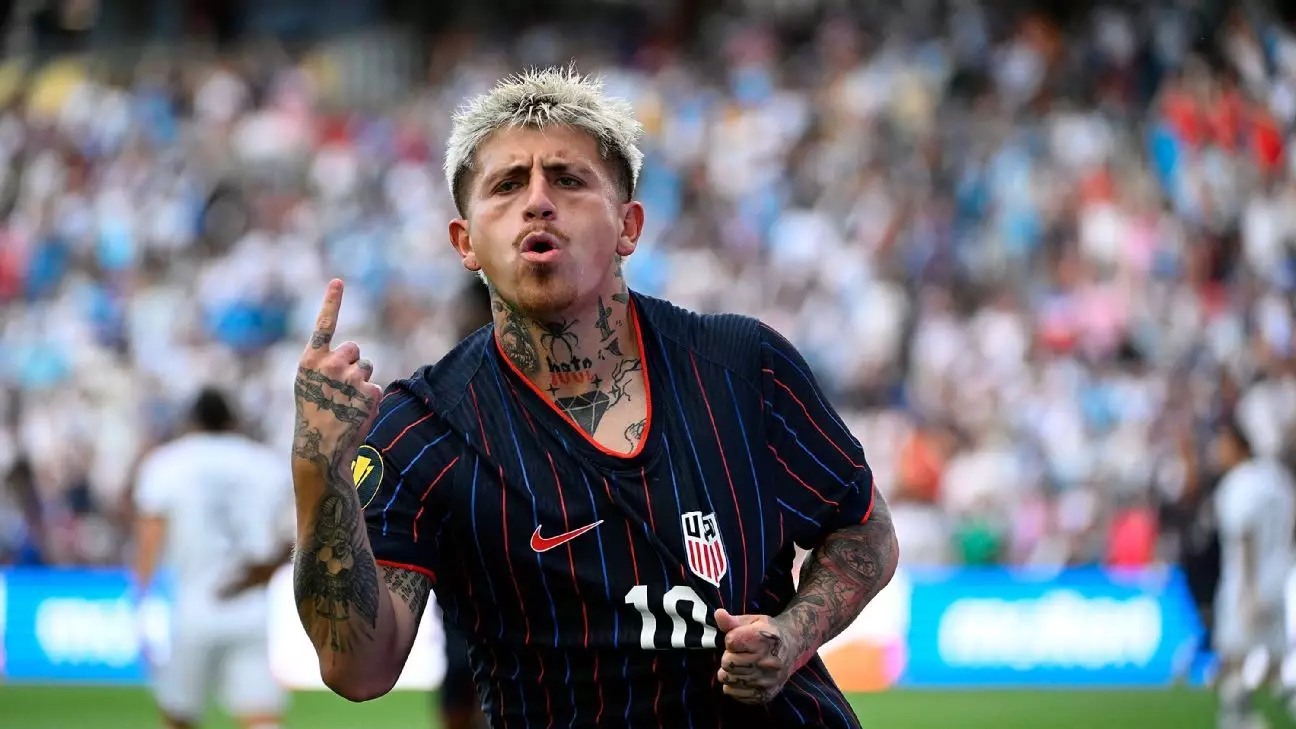In the world of sports, talent alone seldom guarantees triumph. This reality was vividly exemplified in the recent Gold Cup semifinal matchup, where U.S. winger Diego Luna demonstrated that a relentless hunger to succeed can elevate a player beyond their technical capabilities. Luna’s brace against Guatemala didn’t just showcase his scoring ability; it revealed a deeper truth about the human spirit’s role in athletic achievement. This is an individual who embodies the fierce determination necessary to turn potential into tangible success, a trait that coaches like Mauricio Pochettino recognize and cherish.
Luna’s intense desire to represent his country is a testament to how ambition and genuine passion can serve as catalysts for growth. At just 21, his journey underscores the importance of internal motivation — the kind that pushes athletes to improve, to fight through adversity, and to seize every opportunity with zeal. It is a reminder that while natural talent is vital, it is the unyielding drive to excel that often makes the difference at crucial moments on the pitch. Luna’s example challenges aspiring athletes worldwide to nurture this intrinsic desire, emphasizing that passion is not just a supplemental trait but the core of sporting greatness.
The Culture of Connection: Soccer’s Emotional Power Play
Beyond individual ambition, the recent match highlighted the profound emotional connection that soccer generates between players, fans, and nations. Pochettino’s remarks on the atmosphere at Energizer Park underscore how the crowd’s fervor, despite being largely from Guatemala, infused the game with an electrifying energy. This passion is the essence of football; it transforms a mere game into a cultural phenomenon, a shared experience that ignites collective pride and emotion.
This emotional intensity is vital for the sport’s growth in countries like the United States, where the game is still cultivating its cultural roots. Pochettino’s admiration for the Guatemalan supporters underscores how the sport’s universal language — passion, emotion, connection — transcends borders. When fans sing, cheer, and shed tears, they become part of a story much larger than just a match. This connection stokes the players’ fire, inspiring them to give everything they have on the field. Cultivating such cultural depth should be a priority for soccer authorities aiming to elevate the sport domestically; passion and community are the true drivers of a thriving football culture.
Resilience and Grit: The True Markers of Championship Teams
Luna’s confession that the team has lacked grit and fighting spirit in the past highlights a crucial lesson: resilience often dictates the difference between mediocrity and greatness. Despite an early lead and dominating phases of play, the U.S. team had to scramble defensively toward the end to contain Guatemala’s late surge. It’s in moments of pressure that character, commitment, and mental toughness become apparent.
The mentality of determination — fighting until the final whistle — is what separates teams that merely compete from those that conquer. Pochettino’s praise for the squad’s progression toward reaching the final signals his belief that mental toughness is being cultivated through experience, discipline, and a relentless desire to improve. For the U.S., future challenges will require this same grit, especially against traditional powerhouses like Mexico. The ability to maintain composure, defend robustly, and capitalize on critical moments is what ultimately determines a team’s destiny.
This emphasis on resilience is not exclusive to soccer; it’s a universal principle applicable in all pursuits. The message is clear: talent may win games, but determination wins championships. For aspiring teams worldwide, adopting a mindset centered around relentless effort and emotional fortitude is the pathway to sustained success.
The Psychological Edge: Desire as a Competitive Advantage
Pochettino’s comments about Luna’s attitude reveal an often overlooked but critical factor in elite sports: the mental landscape. Desire, hunger, and emotional investment are intangible qualities that can elevate a player from ordinary to extraordinary. The Argentine coach’s recognition of Luna’s “desperate” commitment underscores a fundamental truth: motivation fuels performance, even in the most intense moments.
In a highly competitive environment, this psychological edge can be the difference between a good player and a game-changer. Athletes driven by profound willpower are more likely to push through fatigue, embrace pressure, and seize fleeting opportunities. The personal investment shown by Luna, coupled with the collective effort of the team, exemplifies how a culture that values desire can unlock hidden potential.
Fostering such an environment requires understanding that sports demand more than physical ability — they require mental resilience and an unwavering commitment to excellence. The implications extend beyond the field, inspiring individuals to pursue their passions with unyielding intensity, knowing that true mastery is as much about mind as it is about muscle.
—
While physical skill is undoubtedly essential, this analysis reveals that the true heart of sporting excellence lies in desire, resilience, and emotional connection. Luna’s story is not just about scoring goals but about embodying the fierce internal drive that propels athletes from being good to legendary. As soccer continues to grow in popularity and cultural significance globally, nurturing these qualities will be pivotal in shaping future champions and athletes driven by genuine passion and relentless pursuit of greatness.


Leave a Reply